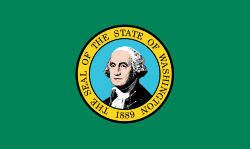| Gun laws in Washington [1] [2] [3] | |
|---|---|
 | |
| Constitution | |
| Constitution sections | Article I, Section 24 |
Synopsis
| |

Gun laws in Washington regulate the sale, possession, and use of firearms and ammunition in the state of Washington in the United States.
The Constitution of Washington protects an individual's right to bear arms. Washington preempts localities from regulating firearms in any manner more restrictive than State law except as explicitly authorized by the State legislature. Authorized local firearm regulations include:
- "Restricting the discharge of firearms in any portion of their respective jurisdictions where there is a reasonable likelihood that humans, domestic animals, or property will be jeopardized. Such laws and ordinances shall not abridge the right of the individual guaranteed by Article I, section 24 of the state Constitution to bear arms in defense of self or others."
- "Restricting the possession of firearms in any stadium or convention center, operated by a city, town, county, except that such restrictions shall not apply to concealed pistol license holders, law enforcement officers, or any showing, demonstration, or lecture involving the exhibition of firearms."
- "Restricting the areas in their respective jurisdictions in which firearms may be sold."
There are some age restrictions on the possession of firearms and some people are prohibited from possessing firearms due to certain criminal convictions or who are released on bond or their own recognizance pending trial for certain criminal charges. Since July 1, 1994, machine guns, short-barreled shotguns, and any parts thereof are prohibited. Suppressors [4] and short-barreled rifles may be possessed and used in accordance with federal law. Pistols transferred through an F.F.L. dealer must be registered with Washington State D.O.L. [5]
There are places where the possession or storage of firearms or ammunition is prohibited or otherwise restricted. Statutory law prohibits firearms in places such as areas of buildings used for court proceedings, certain areas of public mental health facilities, establishments which serve alcohol and are off-limits to persons under 21 years of age, restricted-access areas of commercial airports, State correctional facilities, and outdoor music festivals. Administrative law prohibits or otherwise restricts the possession or storage of firearms in places such as certain schools, premises of the Office of Administrative Hearings, child care centers, horse races, near certain explosive materials, and certain shelters for respite or youths. See the Washington 'infobox' or one of this section's referenced documents for the complete list as well as where exceptions apply for those who hold concealed pistol licenses.
As a general rule, a person may legally open carry without a permit in Washington state in any place it is legal to possess a loaded handgun, as long as it does not manifest "an intent to intimidate another or [warrant] alarm for the safety of other persons." A properly holstered visible handgun will not generally fall under that clause. To open-carry a loaded handgun in a vehicle (e.g, car, bus, etc ...) a person must have a valid concealed pistol license. The county sheriff or city police chief shall issue a concealed pistol license to any applicant, age 21 or older, who meets certain requirements, including no felony convictions, no misdemeanor domestic violence convictions, and no outstanding warrants. [6] [7]
In Washington, the police may temporarily seize guns from people a judge deems a threat to themselves or others. Law enforcement personnel may alert mental health professionals, who can determine if someone is a threat or needs involuntary treatment. The police must notify any family or household members who want to know about a gun being returned to the person from whom it was taken away. [8] [9] [10]
Several new gun control provisions were enacted when I-1639 was approved by the voters in November 2018. [11] These include increased background checks, firearm safety training, a waiting period and a 21 years old age minimum before buying semi-automatic rifles, [12] [13] new age limitations on who may purchase or possess certain firearms, including prohibiting some firearm purchases by persons under age 21, and require certain secured firearm storage or trigger-locks, and criminalizing certain firearm storage if it results in unauthorized use. [14] [15] Some local counties have adopted Second Amendment sanctuary resolutions in opposition. [16]
On April 25, 2023, new gun restrictions were passed, including a ban on the sale, distribution, importation, and manufacturing of certain semi-automatic firearms classified as assault weapons. Possession of assault weapons already owned by state residents remains legal. The state also implemented a ten-day waiting period and a training requirement for firearm purchases. Additionally, a new law allows residents to sue gun manufacturers for irresponsible conduct. [17] [18] [19]